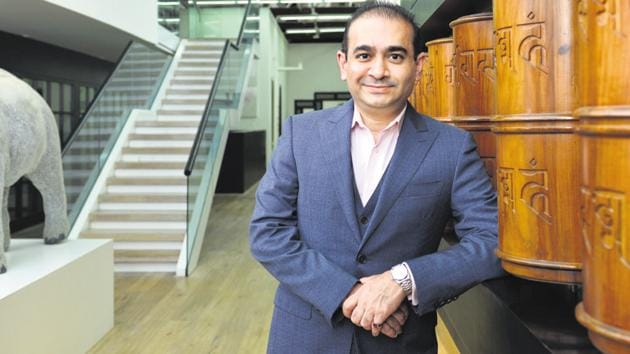UK judge rejects Nirav Modi’s bail request. It was his sixth
Nirav Modi has offered progressively higher amounts and more stringent conditions for his release on bail but judges have rejected them on the ground that he potentially poses a flight risk.
Diamantaire Nirav Modi, who was arrested in London in March 2019, was on Monday denied bail for the sixth time after the Westminster Magistrates Court refused to accept a ‘change of circumstances’ since his last application.

The magistrates court has now refused him bail four times; the high court of England and Wales, as well as the appeals court, had earlier rejected similar requests. “There was a hearing for bail application today, it was not granted. The next hearing is listed for November 3,” a spokesperson of the Westminster Magistrates Court said.
Nirav Modi, 49, remains lodged in the Wandsworth prison, awaiting further hearings in his extradition case. The case was heard over five days in September and is scheduled for further hearings on November 3 and December 1 in the magistrates court. The grounds mentioned by his legal team for seeking bail have included his worsening medical condition and threats to him in jail.
Modi has offered progressively higher amounts (4 million pounds in March) and to follow more stringent conditions as part of bail packages, but judges have rejected the applications on the ground that he potentially poses a flight risk.
Modi is the subject of two extradition requests; one processed by the Central Bureau of Investigation and the other by the Enforcement Directorate. Under UK extradition rules, the court needs to determine whether there is a prima facie case based on material supplied by the Indian government.
Also Read: ‘Nirav Modi won’t get fair trial in India’: Ex-SC judge Katju tells London court
The charges against Modi involve loans in excess of Rs 11,300 crore extended by the Mumbai branch of Punjab National Bank (PNB) to his companies.
The CBI case accuses him of large-scale fraud by fraudulently obtaining loan agreements, formally referred to as Letters of Understanding (LOUs); the ED case relates to the laundering of the proceeds of this alleged fraud.
The second extradition request was made on the basis of two additional offences as part of the CBI case. It was certified by home secretary Priti Patel on February 20 as required under the 1993 India-UK extradition treaty.
The additional offences relate to allegations that Modi interfered with the CBI investigation by “causing disappearance of evidence” and intimidating witnesses (”criminal intimidation to cause death”).
India’s case is that Modi and his companies obtained loans without credit facilities in place; without providing the requisite cash margin; without proper documentation; without paying a proper commission and LOUs not being properly recorded in PNB’s systems; and the proceeds of which were wrongly diverted either to repay earlier loans and/or to the benefit of a series of linked Modi-controlled companies.
The Indian government, which is represented in the court by the Crown Prosecution Service (CPS), has alleged that the fraudulent LOUs would not have been issued without the active involvement of the co-accused PNB officers.






